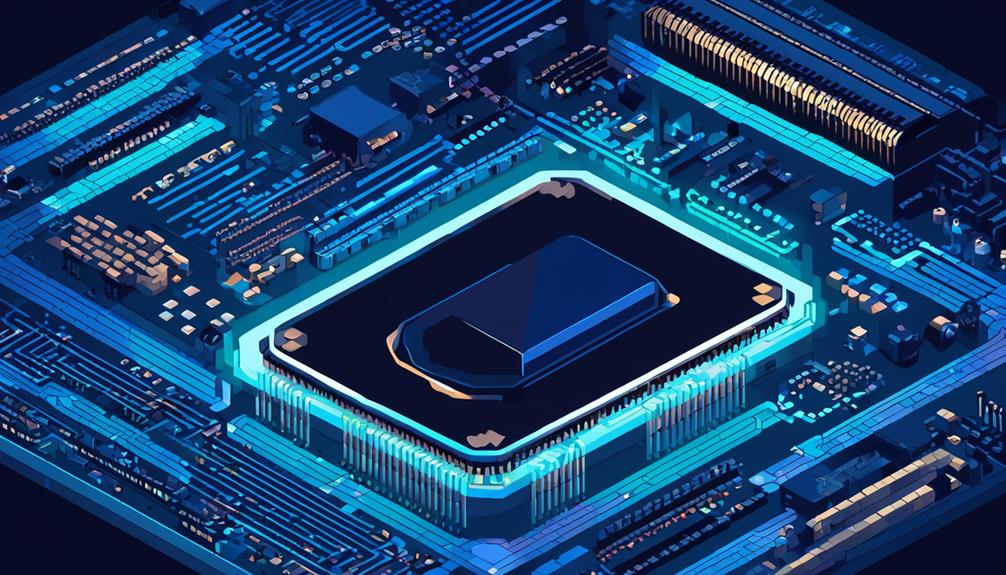With the increasing importance of data privacy and security in today's digital landscape, the need for advanced encryption hardware has become more critical than ever before.
Advanced encryption hardware refers to specialized devices that employ encryption algorithms, such as AES, to safeguard sensitive information from unauthorized access and interception.
These hardware solutions offer a superior level of protection by efficiently encrypting and decrypting data, minimizing latency, and reducing vulnerability to malware and errors.
In this discussion, we will explore the basics of AES encryption, different types of advanced encryption hardware, key features that make them stand out, and the benefits they offer in various sectors.
Additionally, we will delve into their applications in secure communication, IoT devices, mobile devices, remote access, and discuss the future advancements that lie ahead.
So, let's dive into the world of advanced encryption hardware and discover how it can revolutionize data privacy and security.
Key Takeaways
- Advanced encryption hardware, such as Hardware Security Modules (HSMs) and Self-Encrypting Drives (SEDs), play a crucial role in managing encryption keys and protecting sensitive data.
- Encryption hardware offers enhanced data privacy and security, ensuring robust protection against unauthorized access and interception.
- Hardware-based encryption solutions, like AES 256 hardware encryption, strengthen data security and make it resistant to brute-force attacks, reducing the risk of data breaches.
- Encryption hardware accelerates encryption and decryption processes, resulting in faster data processing, improved system performance, and reduced CPU utilization.
AES Encryption Basics

AES Encryption Basics is a fundamental aspect of data security, employing the Advanced Encryption Standard (AES) algorithm to safeguard information through a series of fixed-size block encryptions using symmetric key encryption. AES, also known as Rijndael, is a widely accepted encryption algorithm that was established by the National Institute of Standards and Technology (NIST) in 2001. It has become the de facto standard for securing data in various applications, including wireless networks, virtual private networks (VPNs), and secure socket layer/transport layer security (SSL/TLS) protocols.
The AES algorithm operates on fixed-size blocks of data, which are typically 128, 192, or 256 bits in length. It supports different modes of operation, such as Electronic Codebook (ECB), Cipher Block Chaining (CBC), Counter (CTR), Output Feedback (OFB), and Cipher Feedback (CFB). These modes determine how the blocks of data are encrypted and decrypted.
The process of AES encryption involves several steps, including key expansion, initial round, main rounds, finalization, and output. It uses the same key for both encryption and decryption, which is known as symmetric key encryption. This means that the same key is used to encrypt the data and then later decrypt it, ensuring that only authorized parties can access the information.
To enhance the security and performance of AES encryption, hardware implementations of AES are commonly used. AES 256, the most secure variant, uses a 256-bit key and provides a higher level of security compared to AES 128 or AES 192. Hardware implementations of AES offer increased speed and efficiency, making them suitable for applications where data privacy and protection are paramount.
Types of Advanced Encryption Hardware
One of the key components in ensuring data privacy is the utilization of advanced encryption hardware. Advanced encryption hardware refers to specialized devices or components designed to perform encryption and decryption processes to secure sensitive data. These devices implement advanced encryption algorithms, such as the Advanced Encryption Standard (AES), to protect data from unauthorized access or interception.
Here are five types of advanced encryption hardware commonly used for data security:
- Hardware Security Modules (HSMs): HSMs are dedicated cryptographic devices that manage encryption keys and perform cryptographic operations. They offer tamper-resistant protection for encryption keys and provide secure key storage and generation.
- Self-Encrypting Drives (SEDs): SEDs are storage devices that automatically encrypt data written to the drive using hardware encryption. They provide transparent encryption, ensuring that data is protected at rest without impacting performance.
- Network Security Appliances: These devices are designed to secure data in transit over networks. They encrypt data packets before transmission and decrypt them upon arrival, ensuring confidentiality and integrity during communication.
- USB Encrypted Drives: USB drives with built-in hardware encryption capabilities provide portable and secure storage for sensitive data. They require a password or PIN to access encrypted data, adding an extra layer of protection.
- Secure Cryptographic Processors: These specialized processors are designed to accelerate cryptographic operations, providing faster and more efficient encryption and decryption capabilities. They are commonly used in high-performance computing systems and networking devices.
Key Features of Encryption Hardware

Encryption hardware offers key features that enhance data privacy and security.
One key feature is the use of enhanced encryption algorithms, such as AES 256, which provide robust protection against unauthorized access.
Additionally, encryption hardware ensures secure key management, allowing for the generation, storage, and distribution of encryption keys in a protected manner.
These key features make encryption hardware an essential tool for safeguarding sensitive data in various industries.
Enhanced Encryption Algorithms
Enhanced encryption algorithms in encryption hardware provide advanced features for ensuring data privacy and security. These algorithms play a crucial role in protecting sensitive information during data transmission and storage.
Here are some key features of enhanced encryption algorithms:
- AES Encryption: AES (Advanced Encryption Standard) is a widely used symmetric key algorithm that offers various key sizes, including 128, 192, and 256 bits. It provides a strong level of security and is commonly used in securing wireless networks, VPNs, and SSL/TLS.
- Flexible Encryption Modes: AES encryption offers modes like ECB, CBC, CTR, OFB, and CFB, allowing organizations to choose the most suitable approach based on their specific requirements.
- Secure Data Transmission: The AES encryption process involves key expansion, initial round, main rounds, and finalization, ensuring secure data transmission and storage.
- Regulatory Compliance: Enhanced encryption algorithms help organizations meet regulatory compliance requirements by providing robust data privacy measures.
- Known Security Strength: AES encryption is known for its resistance to known practical attacks, its widespread adoption, and its availability as an open-source standard.
Secure Key Management
Secure key management is a critical aspect of encryption hardware. It involves ensuring the secure generation, storage, and distribution of encryption keys. Encryption hardware incorporates key management features such as key generation, secure key storage, key distribution, and key revocation. These features are designed to effectively manage cryptographic keys. They may support multiple key types, including symmetric and asymmetric keys. Additionally, they facilitate key rotation and key lifecycle management.
Implementing secure key management in encryption hardware is crucial for organizations. It helps protect against key tampering and unauthorized access. Furthermore, it ensures compliance with security standards and regulations. By doing so, organizations can prevent unauthorized access to sensitive data, protect against data breaches, and maintain the confidentiality and integrity of encrypted information. As a result, secure key management is essential for implementing AES encryption and safeguarding data privacy.
Benefits of Using Encryption Hardware
Using encryption hardware offers several benefits for data security and privacy.
Firstly, it enhances data security by providing a higher level of protection against unauthorized access and interception.
Additionally, encryption hardware enables increased performance with faster data processing and transmission speeds, ensuring efficient encryption and decryption operations.
These benefits make encryption hardware a valuable tool in safeguarding sensitive information and meeting regulatory requirements for data protection.
Enhanced Data Security
Implementing encryption hardware can significantly enhance data security by providing robust protection against unauthorized access and interception. This advanced encryption hardware ensures data confidentiality and integrity, safeguarding sensitive information from potential security breaches.
By utilizing hardware-based encryption, organizations can benefit from increased security and performance, reducing vulnerability to malware and errors. The implementation of AES 256 hardware encryption further strengthens data security, making it resistant to brute-force attacks.
Additionally, hardware encryption keys, such as AES encryption keys, offer easy and automatic encryption, independent of the operating system type. With the use of encryption algorithms and encryption hardware, organizations can ensure enhanced data security, mitigating the risks of data breaches and safeguarding data privacy.
Improved Performance
By utilizing encryption hardware, organizations can experience significant improvements in data processing speed and system performance.
Encryption hardware accelerates the encryption and decryption processes, resulting in faster data processing. It reduces latency by minimizing the time taken to encrypt and decrypt data, allowing for quicker access to secured information.
Moreover, encryption hardware enhances throughput by efficiently handling encryption tasks, thereby improving overall system performance. It also reduces CPU utilization by offloading encryption operations to dedicated hardware, freeing up processing power for other tasks. This is particularly beneficial when dealing with large volumes of data or computationally intensive encryption algorithms like AES (Advanced Encryption Standard).
Additionally, hardware-based encryption solutions offer scalability to support increasing data volumes and performance requirements, making them suitable for organizations with growing data privacy needs.
Secure Communication With Encryption Hardware

Secure communication can be achieved through the use of encryption hardware, ensuring the confidentiality and integrity of transmitted data. Encryption hardware employs advanced technologies like AES-256, providing robust protection against unauthorized access and interception.
Here are some key points about secure communication with encryption hardware:
- Superior Security: Hardware-based AES encryption offers enhanced security compared to software-based encryption. It utilizes dedicated processors and secure key storage to protect sensitive data from unauthorized access.
- Enhanced Performance: Hardware-based encryption provides faster processing speeds, enabling real-time encryption and decryption of data without compromising system performance.
- Automatic Encryption: AES encryption keys can be implemented in hardware, eliminating the need for passwords or user intervention. This ensures automatic and seamless encryption of data, enhancing data privacy and reducing the risk of human error.
- Compliance with Data Protection Laws: Implementing encryption hardware helps organizations adhere to data protection laws and regulations, such as the General Data Protection Regulation (GDPR). By encrypting data during transmission, organizations can demonstrate their commitment to safeguarding customer information and maintaining data privacy.
- Overall Data Security: Encryption hardware plays a crucial role in maintaining the overall security of an organization's data. It acts as a protective layer, ensuring that sensitive information remains secure during communication, thereby reducing the risk of data breaches and unauthorized access.
Encryption Hardware Vs. Software Solutions
Encryption hardware and software solutions differ significantly in their approach to securing data, with encryption hardware offering dedicated, specialized hardware for encrypting and decrypting data, while software solutions rely on general-purpose computing devices. The choice between encryption hardware and software solutions depends on the specific needs and requirements of an organization or individual seeking to protect their data privacy.
To better understand the differences between encryption hardware and software solutions, let's compare them side by side:
| Encryption Hardware | Software Solutions | |
|---|---|---|
| Processing Speed | Faster processing speeds and lower latency due to dedicated hardware capabilities. | Slower processing speeds and higher latency due to reliance on general-purpose computing devices. |
| Security | Enhanced security by isolating encryption processes from the host system and potential vulnerabilities. | Vulnerable to malware and unauthorized access due to reliance on the host system. |
| Data Protection | Provides a higher level of data protection by being more resistant to malware and unauthorized access. | Less resistant to malware and unauthorized access, making data more vulnerable. |
| Integration | Can be integrated into various devices and systems, offering flexible deployment options for securing data. | Limited integration options, as software solutions are typically dependent on the host system. |
When it comes to advanced encryption and keeping data safe, encryption hardware has several advantages over software solutions. These dedicated hardware devices offer faster processing speeds, lower latency, enhanced security, and better data protection. By isolating encryption processes from the host system, encryption hardware provides an additional layer of security against potential vulnerabilities. Additionally, encryption hardware can be integrated into various devices and systems, providing organizations and individuals with flexible deployment options to meet their specific data privacy needs.
Choosing the Right Encryption Hardware

When selecting encryption hardware, it is crucial to consider several key factors to ensure optimal data security and compatibility with existing systems.
Consider the key length: Choose hardware that supports AES with key lengths of 128, 192, and 256 bits depending on your security requirements. Longer key lengths provide stronger encryption and are more resistant to brute-force attacks.
Evaluate performance: Look for hardware that offers hardware acceleration for AES encryption to ensure efficient and high-speed data processing. This will help minimize any performance impact on your systems.
Assess compatibility: Ensure the encryption hardware is compatible with your existing systems and infrastructure to facilitate seamless integration. This includes checking for compatibility with your operating system, network infrastructure, and any specific software applications you use.
Prioritize security: Select hardware that provides robust physical and logical security features to safeguard against unauthorized access and tampering. Look for features such as tamper-proof casing, secure key storage, and support for secure boot processes.
Consider scalability: Choose encryption hardware that can scale to accommodate future data security needs and evolving encryption standards. This will help ensure that your investment in hardware remains relevant and effective in the long term.
Integration of Encryption Hardware in Network Security
To ensure optimal data security and enhance overall network protection, organizations can integrate encryption hardware devices specifically designed to handle encryption and decryption processes within their network infrastructure. This integration provides an additional layer of protection to sensitive data, ensuring its confidentiality and integrity.
The integration of encryption hardware in network security involves deploying dedicated hardware security modules (HSMs), cryptographic accelerators, and encrypted storage solutions. These devices are optimized to provide high-performance encryption and decryption capabilities, reducing the processing burden on network devices and enhancing overall security.
One commonly used encryption algorithm in hardware-based solutions is the Advanced Encryption Standard (AES). AES is a symmetric encryption algorithm that provides strong data protection by using a combination of substitution, permutation, and linear transformations. By integrating AES hardware accelerators, organizations can achieve faster encryption and decryption speeds, enabling real-time secure communication and minimizing latency.
Hardware-based encryption solutions offer increased resistance to unauthorized access and provide efficient data protection without compromising network performance. They provide a secure environment for cryptographic operations, protecting sensitive data in transit and at rest.
Advanced Encryption Hardware for Data Centers

Data centers play a crucial role in storing and processing vast amounts of sensitive information. This makes robust encryption algorithms and secure data transmission essential. Advanced encryption hardware, such as dedicated encryption accelerators and cryptographic co-processors, can provide the necessary speed and efficiency required for data centers to implement AES-256 encryption.
These hardware solutions ensure the confidentiality and integrity of data, protecting against potential threats posed by quantum computing technology.
Secure Data Transmission
Advanced encryption hardware plays a crucial role in ensuring the secure transmission of data in data centers.
One of the widely used encryption algorithms for secure data transmission is the Advanced Encryption Standard (AES). AES is a block cipher that encrypts data in fixed-size blocks of 128, 192, or 256 bits. It employs symmetric key encryption, where the same key is used for both encryption and decryption.
AES supports different implementation types, such as ECB, CBC, CTR, OFB, and CFB modes, each with its own methods for encrypting data blocks.
AES encryption is highly secure and resistant to known practical attacks. It is widely accepted as a standard for securing wireless networks, VPNs, and SSL/TLS, offering enhanced data privacy and ensuring secure data transmission in data centers.
Robust Encryption Algorithms
Robust encryption algorithms play a pivotal role in ensuring the utmost security of data transmission in data centers.
One such algorithm is the Advanced Encryption Standard (AES), which is widely recognized for its security and extensively used for securely encrypting data. AES encrypts data in fixed-size blocks of 128, 192, or 256 bits, offering different implementation types for varied encryption needs.
Its encryption process involves key expansion, initial round, main rounds, finalization, and output. AES is commonly used in wireless networks, VPNs, and SSL/TLS to protect data.
Hardware implementation of AES 256 provides increased security and performance, with the potential for speeds up to 10Gbps. This makes it suitable for various industries' secure data transmission and storage needs, ensuring data privacy and protection.
Encryption Hardware for Cloud Computing
Encryption hardware plays a crucial role in ensuring the security and protection of data in cloud computing environments. With the increasing reliance on cloud services for storing and processing data, it is essential to have robust encryption mechanisms in place to safeguard sensitive information from unauthorized access or breaches.
Here are some key points to consider regarding encryption hardware for cloud computing:
- Hardware implementations of advanced encryption standards (AES), such as AES-256, offer enhanced security and performance compared to software-based encryption solutions. This ensures that the data is securely encrypted and decrypted without compromising the system's performance.
- AES, being a symmetric key block cipher, is widely adopted as a proven and secure encryption standard. Its use in cloud computing environments helps protect data privacy and confidentiality.
- The emergence of quantum computers poses a potential threat to the security of AES encryption. To address this concern, researchers are actively working on developing quantum-resistant encryption algorithms that can withstand attacks from quantum computers.
- It is crucial to securely manage the encryption keys used in cloud computing environments. AES encryption keys should be stored in different locations to minimize the risk of unauthorized access. In cases where encryption keys are compromised, they should be promptly replaced to maintain data security.
- Encryption hardware provides an additional layer of protection for data in cloud computing environments. By offloading encryption and decryption tasks to dedicated hardware, the computational burden on the cloud infrastructure is reduced, enabling faster and more efficient processing of encrypted data.
Encryption Hardware for Iot Devices

With the growing reliance on cloud services for data storage and processing, encryption hardware has become essential in ensuring data privacy and security. Advanced encryption hardware plays a crucial role in safeguarding the data privacy of IoT devices. One popular encryption standard used for IoT devices is the Advanced Encryption Standard (AES). AES encryption hardware provides robust electronic data protection with key lengths up to 256 bits, ensuring data confidentiality and integrity.
The hardware implementation of AES 256 offers increased security and performance up to 10Gbps, making it suitable for secure data transmission and storage in IoT devices. By utilizing AES encryption hardware, sensitive IoT data can be protected from breaches, ensuring compliance with data protection laws and preventing unauthorized access or interception.
AES encryption keys, available in 128-bit and 256-bit strengths, can be used to secure IoT devices. The 256-bit encryption strength provides an astronomical number of possible keys, making brute force attacks unfeasible. This ensures that the data stored and transmitted by IoT devices remains secure and inaccessible to unauthorized individuals.
Furthermore, the hardware implementation of AES encryption brings assurance in case of device loss or theft. The contents of IoT devices remain inaccessible without the physical encryption key, adding an additional layer of protection for the data stored within the devices.
Encryption Hardware for Mobile Devices
Mobile devices rely on encryption hardware to ensure the privacy and security of data stored and transmitted on these devices. Encryption hardware plays a crucial role in safeguarding sensitive information, protecting against unauthorized access and potential data breaches.
Here are some key points about encryption hardware for mobile devices:
- Standard encryption algorithms: Mobile devices utilize standard encryption algorithms such as AES (Advanced Encryption Standard) to encrypt data. AES is a symmetric block cipher that ensures the confidentiality, integrity, and authenticity of the transmitted data.
- Data protection: Encryption hardware provides a layer of protection for sensitive data stored on mobile devices. By encrypting the data, it becomes unintelligible to unauthorized individuals, making it significantly harder for them to access or decipher the information.
- Hardware acceleration: Encryption hardware in mobile devices includes specialized components designed to efficiently perform encryption operations. These hardware accelerators enhance the encryption process, enabling faster and more secure data encryption.
- Mobile device performance: Encryption hardware is optimized to minimize the impact on mobile device performance. By leveraging dedicated hardware components, encryption operations can be performed quickly and efficiently without impacting the overall device performance.
- Compliance requirements: Encryption hardware in mobile devices is essential for meeting compliance requirements. Industries such as healthcare, finance, and government often have specific regulations regarding data privacy and security. Encryption hardware ensures that mobile devices comply with these regulations and protect sensitive data accordingly.
Encryption Hardware for Remote Access

Remote access requires reliable and secure encryption hardware to ensure the confidentiality and integrity of data transmissions. One effective solution for this is AES 256 Hardware Encryption, which utilizes a symmetric block cipher to secure data in an encrypted format. Implementing AES 256 as hardware offers increased security and performance compared to software encryption methods.
The use of hardware implementation allows AES 256 to perform at speeds up to 10Gbps without significant latency. This means that data can be transmitted quickly and efficiently while maintaining a high level of security. Furthermore, AES 256 utilizes a 256-bit key, which offers the highest level of security among different key lengths. This ensures robust electronic data protection for sensitive information during remote access.
To provide a visual representation of the advantages of encryption hardware for remote access, the following table highlights the key benefits:
| Encryption Hardware for Remote Access |
|---|
| Increased Security |
| Enhanced Performance |
| Robust Data Protection |
Future Advancements in Encryption Hardware
Future advancements in encryption hardware are poised to revolutionize data security and protection. As technology continues to evolve, the emergence of Quantum computing is expected to have a significant impact on encryption methods. Here are some key points to consider:
- Quantum Impact: Quantum computers have the potential to break the encryption algorithms that are currently considered secure. This could render widely-used encryption methods, such as AES 256, vulnerable to attacks. It is crucial to develop encryption hardware that can withstand the power of quantum computing.
- Hardware Implementation: Hardware implementation of encryption algorithms, like AES 256, offers enhanced security and performance. These hardware solutions can achieve speeds up to 10Gbps, ensuring that data is encrypted and decrypted quickly and efficiently.
- Global Recognition: AES is the only publicly available cipher approved by the NSA for top-secret communication. It is also included in ISO/IEC 18033-3 as a globally recognized standard. Future advancements in encryption hardware should continue to support these widely accepted encryption algorithms.
- Brute Force Resilience: The key space of AES 256 is so vast that even the world's fastest supercomputer would require an unimaginable amount of time to crack it through brute force. Future advancements in encryption hardware should focus on maintaining this level of resilience against brute force attacks.
- Future Advancements: The future of encryption hardware holds exciting possibilities. It may include larger key sizes, new modes of operation, and innovative solutions to address the potential impacts of quantum computing. These advancements will have far-reaching implications for sectors such as healthcare, financial services, IoT, and data security.
Frequently Asked Questions
What Is the Most Advanced Type of Encryption?
The most advanced type of encryption is constantly evolving as technology advances and new threats emerge. Currently, the most secure encryption algorithms include AES-256, which offers a high level of security and resistance to brute force attacks.
In addition, quantum encryption technology is being developed as a potential solution to protect data from quantum computing threats. Encryption protocols for IoT devices and encryption for cloud computing are also important areas of research.
Post-quantum encryption techniques are being explored to ensure data privacy in the future.
What Are the Four 4 Most Secure Encryption Techniques?
There are several encryption techniques that are considered to be highly secure. These include:
- Secure key management: This technique ensures that encryption keys are properly protected and managed to prevent unauthorized access.
- Quantum resistant encryption: These algorithms are designed to withstand attacks from quantum computers, which have the potential to break traditional encryption methods.
- Homomorphic encryption: This technique allows computations to be performed on encrypted data without decrypting it.
- Post-quantum encryption: This refers to encryption algorithms that are resistant to attacks from quantum computers.
These encryption techniques are crucial for ensuring data privacy and security, especially in IoT devices where sensitive information is often transmitted and stored.
What Are the 3 Types of Encryption Devices?
Encryption devices are hardware components designed to encrypt and decrypt data, providing an additional layer of security. These devices utilize encryption algorithms, techniques, standards, and protocols to ensure data privacy.
There are three types of encryption devices:
- Hardware encryption devices: These include secure USB drives and self-encrypting SSDs. They encrypt data at the hardware level, making it more difficult for attackers to access sensitive information.
- Software encryption devices: These devices use software applications to encrypt data. Users can install encryption software on their devices to secure their data.
- Cloud-based encryption devices: These devices encrypt data stored in the cloud. They are especially useful for organizations that store sensitive information in cloud-based platforms.
Has AES 256 Been Cracked?
The AES 256 encryption algorithm, known for its robust security, has not been cracked. With a key length of 256 bits, the AES encryption strength is exceptionally high, making it resistant to brute force attacks.
Its implementation can be in the form of hardware or software, providing flexibility for various applications. However, it is worth noting that the emergence of quantum computers poses a potential vulnerability to traditional encryption algorithms like AES 256.

